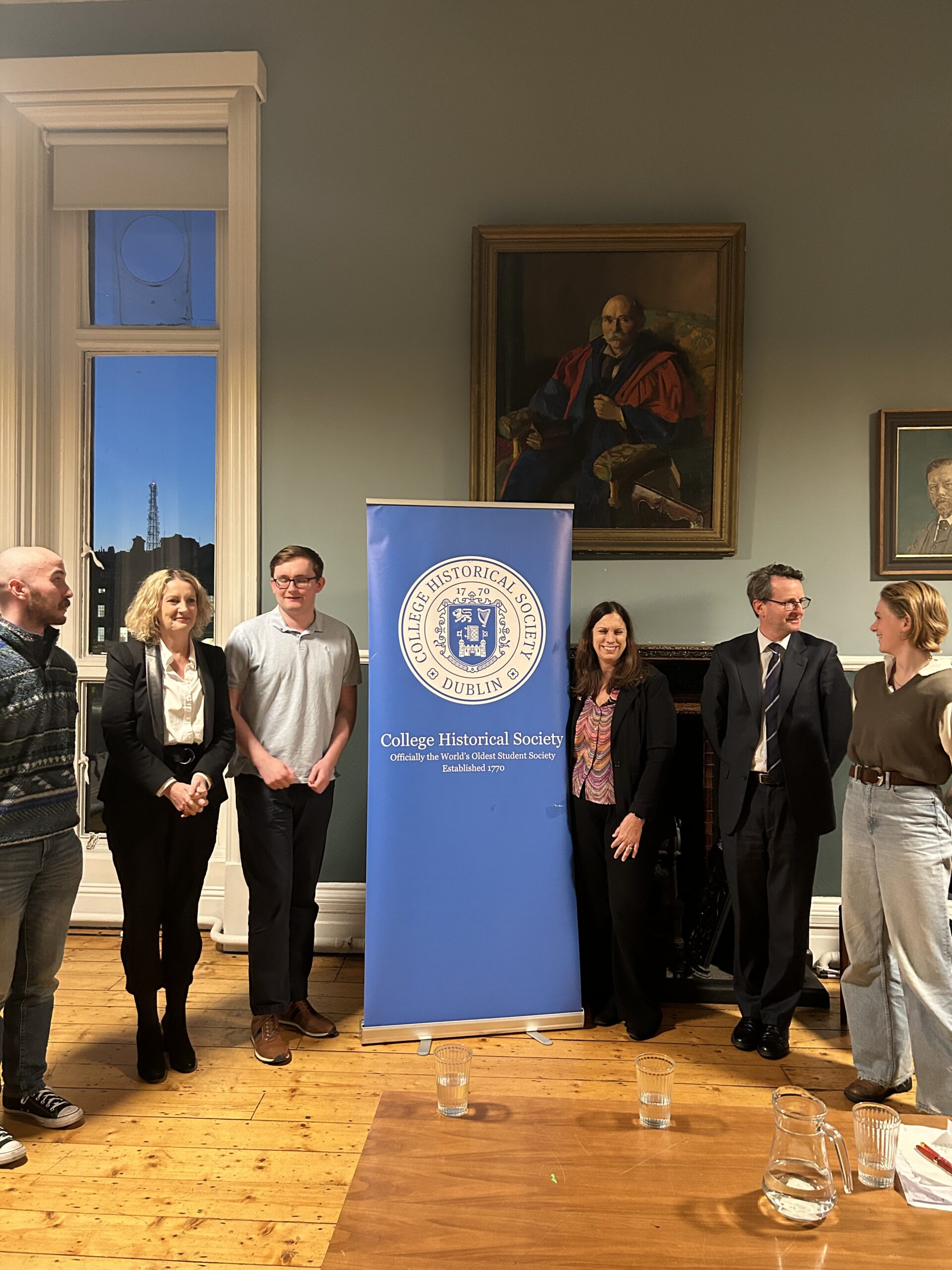
The Robinson Subcommittee of the College Historical Society hosted one of their most influential panels yet, on the evening of November 21. Focusing on the importance of archives and archival work in the 21st century, the Robinson Subcommittee invited Orlaith McBride, Ireland’s first female Director of the National Archives and Dr. Colleen Shogan, the first female Archivist of the United States. The discussion was moderated by Dr. Patrick Geoghegan, a professor of modern history at Trinity and a vice president of the Hist.
Orlaith McBride was appointed to be Director of the National Archives/An Chartlann Náisiúnta in 2020 after immense success in her role of Director of the Arts Council for nearly a decade. During her first few years at the Archives, she curated the Decade of Centenaries Commemorations Programme and is now involved with the publishing of the 1926 Census, the first census of the Irish Free State. Her previous work in the arts and culture sector has propelled public outreach from the Archives which emphasises cultural engagement and understanding.
Dr. Colleen Shogan stepped into her role as Archivist of the United States in 2023. Following a presidential appointment and senate hearing, she took her position as the first female National Archivist. The Archivist holds a critical responsibility for the nation–they serve to protect, preserve, and share the nation’s governmental records. The US National Archives contains over 13.5 billion documents, all of which Shogan oversees. Shogan has taken the challenges of digitisation and amplifying public interest within the archives in stride. Her work as an author, political science professor, and Senate staffer culminate in an expert foundation to lead the National Archives.
The archives of a nation are often overlooked in the public eye, yet the careful documentation and preservation of history is now more important than ever. As McBride recalled, “it is all about the authenticity of the record.” In both the United States and Ireland, the delicate preservation of national documents sets the foundation for a stable democracy ahead. Without a clear and unaltered comprehension of our past, nations cannot move swiftly towards the future.
Dr. Geoghegan led immediately into a question of utmost relevance to the world of archival preservation–the role of digitisation and technical innovation. The archival process has changed immensely with the introduction of AI and digital technology. McBride explained that the application of digital technology within the National Archives has been a key tool in expanding the sector. It would take the average person nearly sixteen years to effectively sift through and digitise the 1926 Irish Census, McBride says. With digital technology, the Archives are on track to publish the 1926 census in about two years. For Shogan, this technology has a similar effect within the US Archives. She explains that US military records, even when in their simplest form, can be nearly 200 pages long. With AI and new technology, the process of shifting these analog documents to a digital format takes far less time.
A few questions from the audience around the concern of AI and technology overtaking the archival industry arose. In response, Shogan emphasised that this technology is not replacing or taking away jobs in the industry, rather it is reimagining the way in which preservation is commenced. The process of digitisation and technological transformation cannot be done in the holistic manner necessary without the collaboration of technology alongside human archivists. And as more government documents occur through digital channels, the process of preserving tweets, emails, or online briefings requires archivists to “be there at the very start of the record’s life,” Mcbride explains.
Both Archives are working on major anniversary projects in the respective nations. With McBride working on the release of the Irish 1926 Census, she’s planning a corresponding exhibit to showcase the story of the Free Irish State. In the US, Shogan is preparing for the 250th anniversary of the signing of the Declaration of Independence. In adhering to the importance of the preservation and showcasing of all integral documents, Shogan explains she made the decision to add the Emancipation Proclamation and the original document of the 19th Amendment to the Rotunda of the National Archives in Washington, DC. As they are also an integral part of the nation’s history, they deserve to be highlighted as such, alongside the Declaration of Independence.
Dr. Geoghegan next prompted another inquiry–can archival documentation be utilised to weaponise the past? Mcbride reiterated that the job of an archivist is to prevent just that. The role of the archivist is not to interpret these documents, rather it is to ensure their most authentic presentation, and make them easily accessible to the public. Both McBride and Shogan emphasise this within their leadership of their respective national archives. They centre their work around applying newfound digitisation technology to present the most authentic documentation of history and ensure it can be easily accessed by anyone, anywhere.
The event concluded with a thunderous applause from a captivated audience. As Dr. Geoghegan put into words, “if you entered this room not interested in archives before, you certainly are leaving with a newfound appreciation for them.” Many of the audience members left with this appreciation for archival work, especially in terms of our democracies. “It’s very interesting how archives are a tool for government transparency, and [subsequently] a tool for democracy, it’s so important,” Andrew Row, a second-year English and History student who attended the panel, explains. The work to further amplify government transparency and democratic processes through archival documentation is far from over, and both McBride and Shogan will continue this integral undertaking.






